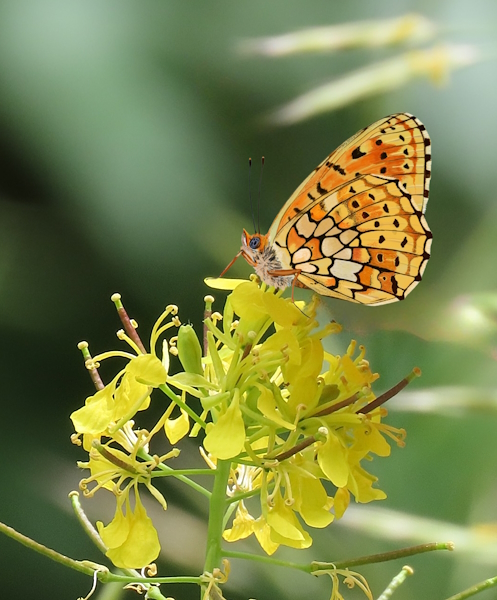
Male, Italy, painted from photographs of a set specimen in Bozano's Guide to the Butterflies of the Palearctic Region (with reference to live specimens from Roger Gibbons's website)

(the same painting, imagined onto a flower)

Distribution
This species does not fly
in
Switzerland and I have yet to see it. It is a butterfly of dry, grassy,
flowery meadows and open woodlands where its foodplant, meadowsweet
grows.
It is very similar in size and general appearance to the lesser marbled fritillary but in both sexes and on both wings the spots in the outer post-discal row are rounder and less obviously part of the submarginal pattern - hence the English name, 'twin spot' fritillary. This distinction can be relatively subtle on the upperside but is very clear on the hindwing underside. This also lacks the violet hues of the other two Brenthis species, the twin rows of spots being set clearly in a yellow and orange ground.
The species flies in Italy, France and Spain, where it is generally local and uncommon, and in south-eastern Europe, where it is said to be commoner. It is on the wing from May, or April in the Balkans, to July or early August. The caterpillar hibernates while still in the egg, hatching out and beginning to feed in February or March.
It is very similar in size and general appearance to the lesser marbled fritillary but in both sexes and on both wings the spots in the outer post-discal row are rounder and less obviously part of the submarginal pattern - hence the English name, 'twin spot' fritillary. This distinction can be relatively subtle on the upperside but is very clear on the hindwing underside. This also lacks the violet hues of the other two Brenthis species, the twin rows of spots being set clearly in a yellow and orange ground.
The species flies in Italy, France and Spain, where it is generally local and uncommon, and in south-eastern Europe, where it is said to be commoner. It is on the wing from May, or April in the Balkans, to July or early August. The caterpillar hibernates while still in the egg, hatching out and beginning to feed in February or March.